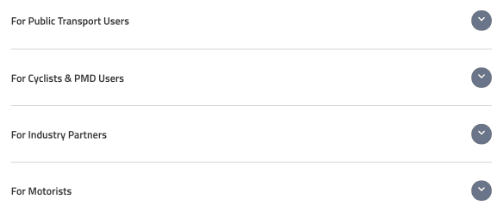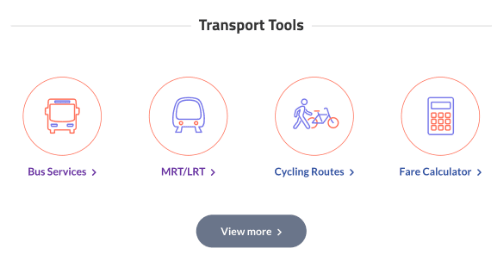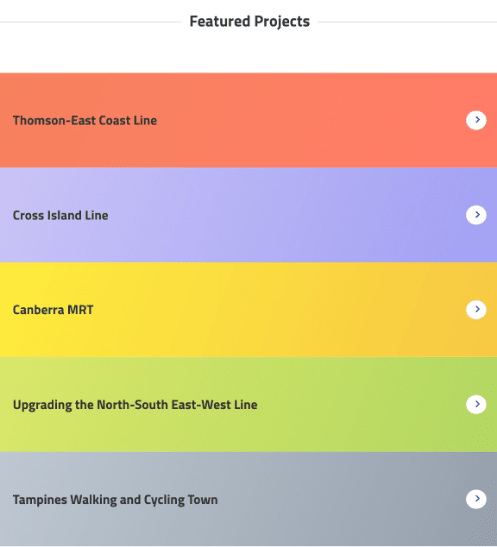As announced at the Ministry of Transport’s Committee of Supply 2024, the Land Transport Authority (LTA) has been engaging various stakeholders on the review of the Point-to-Point Transport (P2P) industry structure and regulatory framework. This comprises commuters, taxi and private hire car (PHC) drivers, transport academics, and tripartite partners, which include the taxi and ride-hail operators, the National Taxi Association, and the National Private Hire Vehicles Association.
2. While the review is still ongoing, LTA will be making several changes to address key areas of feedback received thus far.
Updating regulatory regime for taxis and PHCs
3. A common piece of feedback from stakeholders during our engagements is that street-hail services, which are provided only by taxis, continue to play an important role in ensuring that P2P services remain accessible to all commuters. This includes seniors who may be less familiar with using ride-hailing apps, tourists, and commuters at locations with very high concentration of demand (e.g. airports, ferry terminals, large-scale events). However, the number of taxis plying the streets has almost halved compared to a decade ago.
4. One reason for the decline in the taxi supply is the higher regulatory requirements for taxis compared to PHCs, which translate to higher operating costs for taxi operators and vehicle rental rates for taxi drivers.
5. LTA has reviewed our regulatory regime for taxis and PHCs and will be making the following changes to the regulations:
a. The statutory lifespan of diesel, petrol and hybrid taxis will be extended to 10 years, up from the current eight years. This will allow taxi operators to recover the cost of the vehicle over a longer period. The current taxi fleet remains well-maintained and roadworthy, with a high average First Inspection Passing Rate (FIPR) of 99.5% in 2023, above the passing standard of 98% for taxi operators.[1]
b. The inspection frequency for taxis less than three years old will be reduced from once every six months to once a year. This will minimise operational downtime for newer taxis, which also have high FIPR (at 99.8%), while still ensuring they are roadworthy.
c. The inspection frequency for chauffeured PHCs (i.e. Z-class PHCs) more than 10 years old will be increased from once a year to once every six months. Chauffeured PHCs which have been driven for a longer period may require more frequent maintenance and inspection. The FIPR of the subset of PHCs aged above ten years is 84.5%, below the passing standard of 90% applicable to the pool of P2P vehicles registered with each ride-hail operator The higher inspection frequency ensures that older PHCs can continue to provide safe and reliable P2P services for commuters.
d. The requirement to provide call-booking services will be removed for smaller taxi operators. Currently, only 1% of all P2P trips are made via call-booking. Given the low utilisation rate, LTA will no longer require smaller taxi operators to maintain call-booking services. LTA will work with ComfortDelGro, which currently fulfils the bulk of call-booking trips, to continue offering call-booking services, so as to meet the needs of commuters who rely on these services.
6. LTA will work with taxi operators to ensure the cost savings, after accounting for additional maintenance expenses due to the increased statutory lifespan, are passed on to taxi drivers.
7. LTA will also streamline the Taxi Driver’s Vocational Licence (TDVL) training curriculum to lower the effort and cost needed to obtain this licence, to encourage more prospective P2P drivers to consider obtaining a TDVL. A TDVL will allow them to drive either a taxi or a PHC.
Improving the resilience of P2P platforms
8. Given the number of commuters and drivers relying on P2P services, their commutes and livelihoods will be affected if there are service disruptions, both to the availability of the ride-hail platform, or from operators exiting the market. To minimise the impact of such disruptions, LTA will introduce two sets of measures:
a. LTA will introduce standards for managing operational disruptions for all taxi and ride-hail operators. Operators must inform LTA, commuters and drivers within an hour of the confirmation of a systemic incident that could impair P2P services, and submit an incident report outlining measures taken to resolve the incident thereafter. Ride-hail operators must develop and regularly review their contingency plans, including necessary operating protocols and system enhancements to ensure timely service recovery and mitigate recurrence of any systemic incidents.
b. Operators that intend to exit the market will be required to provide LTA with an exit plan and a minimum notice of 120 calendar days, double the current notice period of 60 calendar days. Operators must also inform commuters and drivers of their exit at least 60 calendar days prior to the date of surrender of their licence, to give drivers and commuters sufficient time to cash out their electronic wallets and transit to alternative platforms.
Improving the matching of different commuter groups to service types
9. Some wheelchair users have shared that they face limitations when booking ride-hail services. Unlike taxis, there is no requirement for all PHCs to have sufficient boot space for a foldable wheelchair. For families with young children below 1.35m, the child must be secured in a child seat for travel in a PHC, but some parents may not be aware of this regulation and either book the wrong service or omit to indicate that they require a child seat.
10. LTA will work with operators to make it easier for commuters to indicate if they require a vehicle that is able to accommodate a foldable wheelchair, or is equipped with a child seat. In addition, all commuters, upon receiving a match, will also be informed if the matched PHC is unable to accommodate a foldable wheelchair or does not come with a child seat. This is so that a commuter who has forgotten to indicate his or her need or booked the wrong service, can cancel and make a new booking within the grace period. LTA will also work with the ride-hail operators to allow drivers to cancel the booking without incurring a penalty if commuters fail to indicate that they require boot space for a foldable wheelchair or a child seat. This will improve matching of commuters to the correct service or vehicle, and help to avoid disputes between commuters and drivers.
Timeline of Review
11. As the proposed changes will require adjustments to operational plans and services, LTA will work with operators to incorporate the changes and requirements as part of their licence renewal. We will provide further details on the implementation date of these regulatory changes and measures at a later date.
12. Beyond this initial set of policy changes, LTA will continue to engage industry stakeholders on other ways to improve the overall stability and adequacy of P2P supply to meet evolving commuter needs, especially in a zero vehicle-growth environment where P2P services play an increasingly important role in complementing mass public transport and reducing the need for car ownership. LTA expects to complete the review by the second half of 2024. More details will be made available after the review is completed.















